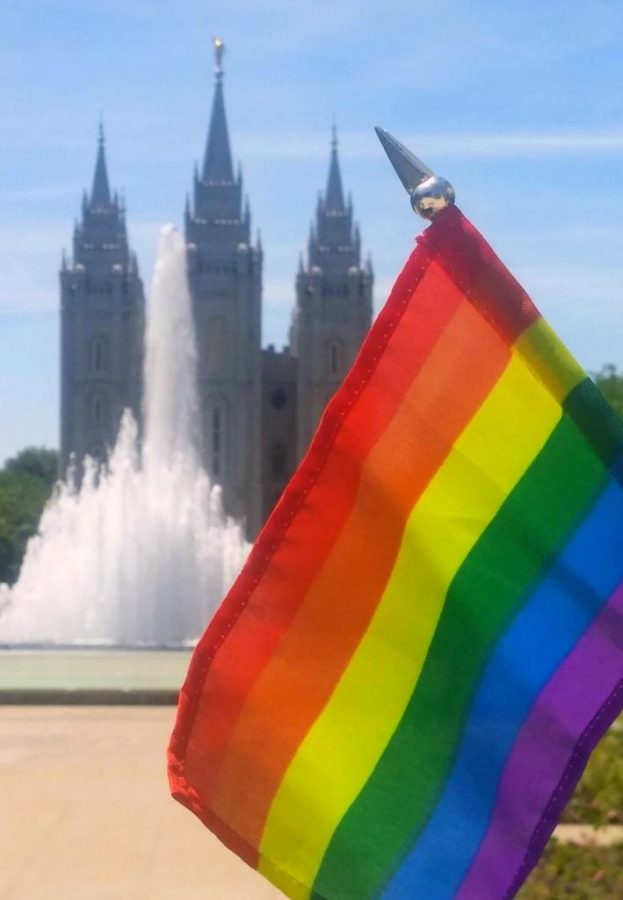
On Aug. 2, the Love Loud music festival was held in Orem, Utah. The brainchild of Dan Reynolds, singer of the Grammy award-winning band Imagine Dragons, this festival was intended to raise funds for several organizations that support at-risk LGBTQ+ youth. In conjunction with groups such as GLAAD, the Trevor Project, Encircle and Stand4kind, this all-day concert included a range of groups including Imagine Dragons, Neon Trees, a solo performance from the singer of Walk the Moon, Nicholas Petricca, and the electro-dance duo Krewella, among others.
Many speakers made appearances over the course of the day, and that was where the trouble started. While there was a wonderful speech given by Dancing with the Stars alumna Julianne Hough, many of the speakers were representatives of the LDS community of Utah. Steve Young, Mormon football Hall of Famer spoke with his wife Barba about LGBTQ+ inclusiveness in Mormon spaces. The master of ceremonies for the evening was Alex Boye, an incredible personality and musician, but regrettably a favorite LDS poster child. A MTE group from BYU performed an art piece that featured dialogue from actual calls to the Trevor Project. Many were calls from LGBTQ+ youth literally moments away from suicide. It felt so wrong for these intimate words to be said by a BYU group, and I will explain why.
The LDS church, and the Mormon culture at large, is systematically and institutionally against the LGBTQ+ community. The LDS church, and their representatives at the music festival, loves to say that it supports all children, no matter their orientation. But this diverges from both actual church policy and the shared experiences of members of the LGBTQ+ community.
Speaking about homosexual couples, the LDS church’s policy reads, “Sexual relations between a man and woman who are not married, or between people of the same sex, violate one of our Father in Heaven’s most important laws and get in the way of our eternal progress.” If you are openly in a homosexual relationship, you are considered to be “living in sin.” These individuals cannot hold church callings, take the LDS sacrament, or attend LDS temple ceremonies, which includes the ability to get married or sealed to family and children, a paramount part of the LDS experience. The church’s policy on transgender individuals is similar; someone who medically transitions is not only barred from participating in Mormon ordinances but may face termination of membership.
From these policies grows an insidious culture in the LDS community where homosexuality and transgenderism are seen as sinful and dirty. They are viewed as something that is to be hidden or treated, like you would a disease. The harm that this causes to individuals is immeasurable, but hopefully a few experiences from the LGBTQ+ community will communicate some of the damage it causes.
Last year, at the age of 19, I came out as transgender to my family. In the following month, I was kicked out of the house and totally ostracized both emotionally and financially from my parents. I was uninvited from the yearly family vacation, had my car taken away, and left completely on my own. On top of this, I was repeatedly and forcefully told how wrong and perverse my decision was. Without going into too much detail, this was all devastating, and led to moments of deep depression and anxiety. Fortunately, I am both financially stable and have a group of people who love and support me outside of my assigned family.
But many youths are not so lucky. I have a friend who just last month came out as transgender to his family, and his treatment was similar to mine. Devastatingly, my friend is 17, and spent three days in a homeless shelter until he finally found refuge at his aunt’s house, however grudgingly she offered it. He is now trying to figure out how to move forward as a minor completely isolated and cut off.
According to the Trevor Project website, LGBTQ+ youth (those between 10 and 24 years of age) are 4 times more a greater risk of attempting suicide. LGBTQ+ youth who are from “highly rejecting families” are 8.4 times as likely to have attempted suicide as LGBTQ+ peers who report low levels of family rejection. Please read those numbers again, and think on all those youths forced to such a place where they feel the only option is to take their own life.
The LDS church, by its policies and its culture propagates this epidemic of depression, self-harm and suicide among the youths of this state and this country. I do understand the intent of the choice of speakers at the Love Loud festival; to foster communication and trust between these two communities. But what must not be stood for is the LDS church’s attempt to pretend that they are blameless, and that they support members of our community. This is false and deeply insulting to the memories of the dead LGBTQ+ youth across the country.
During the festival no mention was made of this, and the Church was painted in a very positive and accepting light. If we cannot be honest about the impact of the LDS church on our youth we will never be able to change church policy and culture. Thousands will continue to harm themselves and die until we can call the LDS church what it is, and work towards a future of true acceptance and love.
University of Utah LGBT+ resource center – 200 S Central Campus Dr. room 408 / 801-587-7973
The Trevor Project’s Trevor Lifeline – 1-866-488-7386 (free, confidential, and available 24/7)
Utah Suicide Prevention lifeline – 1-800-273-8255 available 24 hours a day
letters@chronicle.utah.edu
